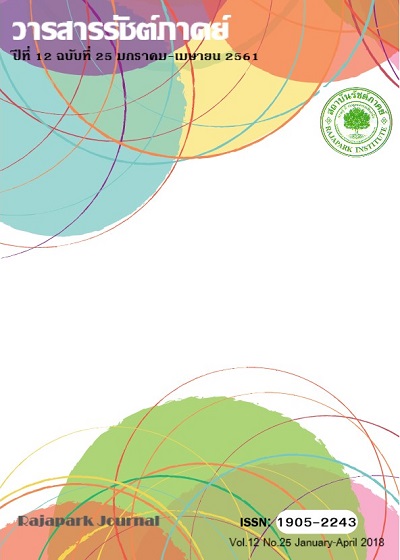The Relationship between Sustainability Performance and Stock Return: An Empirical Study of the Listed Companies on the Stock Exchange of Thailand Awarded Dow Jones Sustainability Index (DJSI)
Main Article Content
Abstract
This paper investigates the relation between corporate sustainability performanceand corporate financial performance by analyzing stocks in the Stock Exchange of Thailand during 2012–2016that they were invited to participate in the Dow Jones Sustainability Index (DJSI), whether or not a DJSI reward has been given to an investor. The study was conducted in order to find out abnormal returns by event studies method. The results indicated that DJSI awarded company has a normalized return and positive return on each test period.As a result, the share price of the company has increased significantly. And it affects the permanent increase in the long run. For companies that do not receive DJSI awards. It is found thatabnormal return on each test period has a negative return. However, there was no statistically significant. Research shows that investors have responded positively to the DJSI awarded.
Article Details

This work is licensed under a Creative Commons Attribution-NonCommercial-NoDerivatives 4.0 International License.
Views and opinions appearing in the Journal it is the responsibility of the author of the article, and does not constitute the view and responsibility of the editorial team.
References
อาณัติ ลีมัคเดช. (2556). การส่งสัญญาณด้วยรางวัลรับผิดชอบต่อสังคม: กรณีศึกษาของบริษัทจดทะเบียนในตลาดหลักทรัพย์แห่งประเทศไทย. วารสารบริหารธุรกิจ, 36(139), 27-42.
Bauer, R., Guenster, N., & Otten, R. (2004). Empirical evidence on corporate governance in Europe: the effect on stock returns, firm value and performance. Journal of Asset Management, 5, 91–104.
Brecchetti, L., R. Ciciretti, I. Hasan, & N. Kobeissi. (2011). Corporate Social Responsibility and Shareholder’s Value.” Journal of Business Research, 65(11), 1628-1635.
Cheung, Adrian Wai Kong. (2011). “Do Stock Investors Value Corporate Sustainability? Evidence from an Event Study.” Journal of Business Ethics, 99(2), 145–65.
Chih, H. L., Chih, H. H., & Chen, T. Y. (2010). On the Determinants of Corporate Social Responsibility: International Evidence on the Financial Industry. Journal of Business Ethics, 93, 115-135.
Consolandi, C., Jaiswal-Dale, A., Poggiani, E., & Vercelli, A. (2009). Global Standards and Ethical Stock Indexes: The Case of the Dow Jones Sustainability Stoxx Index. Journal of Business Ethics, 87, 185-197.
Fama, E. F., Fisher, L., Jensen, M. C., & Roll, R. (1969), The adjustment of stock prices to new information. International Economic Review, 10(1), 1–21.
Freeman, R.E. (1984). Strategic management: A stakeholder approach. Pitman, Boston.
Jones, R.N., P. Dettmann, G. Park, M. Rogers, & T. White. (2007). The relationship between adaptation and mitigation in managing climate change risks: a regional approach. Mitig. Adapt. Strat.Glob. Change, 12, 685–712.
Konar, S., & Mark, C. (2001). Does the Market Value Environmental Performance?. Review of Economics and Statistics, 83(2), 281-289.
Lopez, M.V., Garcia, A., & Rodriguez, L. (2007). Sustainable Development and Corporate Performance: A Study Based on the Dow Jones Sustainability Index. Journal of Business Ethics, 75, 285-300.
Lourenc¸o, I. C., Branco, M. C., Curto, J. D., & Euge´nio, T. (2012). How does the market value corporate sustainability performance. Journal of Business Ethics, 108(4), 417–428.
Lynch, A.W., & Mendenhall, R.R. (1997). New Evidence on Stock Price Effects Associated with Changes in the S&P 500 Index. The Journal of Business, 70, 351-383.
Waddock, S.A., & Graves, S.B. (1997). The Corporate Social Performance-Financial Performance Link. Strategic Management Journal, 18, 303-319.
Waldman, D.A., Siegel, D., & Javidan, M. (2006). Components of transformational leadership and corporate social responsibility. Journal of Management Studies, 43.


